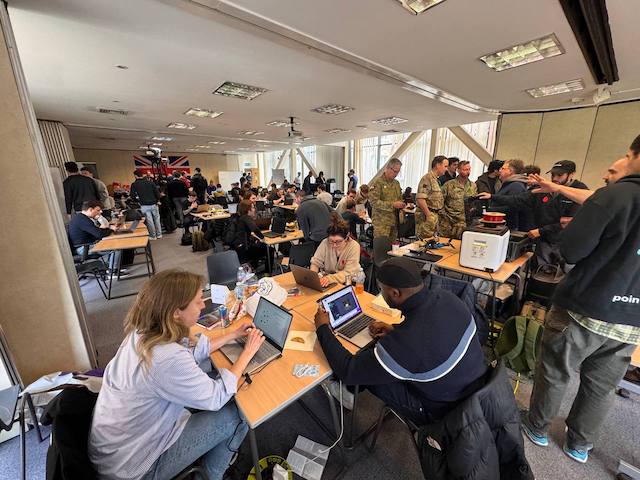
Last week marked a significant milestone for UK-Ukraine relations as the UK announced its largest ever military support package to Ukraine. This substantial commitment elevates the UK’s total support for the current financial year to £3 billion, showcasing a robust effort to aid Ukraine amidst its ongoing conflict with Russia, though still trailing behind the US’s recent $50 billion pledge.
In a groundbreaking initiative aimed at bolstering Ukraine’s asymmetric warfare capabilities, the London Defense Tech Hackathon was inaugurated last weekend. This pioneering event is a vivid example of the UK’s efforts to blend rapid civilian tech innovation with the military’s strategic requirements. Coordinated by Alex Fitzgerald of Skyral and Richard Pass of Future Forces, the hackathon also saw collaboration from the Honourable Artillery Company, Apollo Defense, Lambda Automata, and D3 VC among others.
The hackathon convened developers with proficiency in both hardware and software, aiming to spark innovation in defense, national security, and deeptech. A focal point was on advancing drone technology, emphasizing both the hardware necessary to direct these drones to their targets and the development of counter-drone systems. This initiative reflects the evolving nature of modern warfare, where drones and electronic countermeasures play pivotal roles, especially for Ukraine in its struggle against a larger adversary.
Fitzgerald highlighted the diverse participation at the event, underscoring the goal of engaging builders, investors, and military personnel in reconsidering defense technology as a viable venture for development or investment. With contributions from entities like the NATO Innovation Fund and the UK National Security Strategic Investment Fund, the hackathon represented a converging point for seasoned defense investors and newcomers intrigued by the sector.
The hackathon’s focus on tangible outcomes was inspired by the success of a similar event in El Segundo, Calif., emphasizing the importance of immediate, impactful innovation in military technology. Participants like Catarina Buchatskiy of Apollo Defense advocated for the hackathon as a means to demystify the defense sector and ignite quick, impactful contributions. Buchatskiy’s personal connection to Ukraine added a poignant reminder of the real-world implications and potential lifesaving outcomes of these technological advancements.
Furthermore, the event underscored the defense sector’s growing appeal within the technology community, even as it navigates controversies such as Google’s recent employee protest over Project Nimbus. The rising interest in defense technology is mirrored by various developments, including Anduril’s advancement in unmanned fighter jet development and discussions in the UK about the future of high-powered laser weapons.
Yet, the initiatives birthed from the hackathon, while not as futuristic as laser weapons, promise immediate and practical applications. For example, a proposed High Speed Interceptor aims at neutralizing Orlan drones, illustrating the hackathon’s direct contribution to current defense needs. This event not only fosters technological advancements but also serves as a potential catalyst for peace and security enhancements, harmonizing military needs with innovative civilian technology solutions.
Source






